Smoking and Tobacco
How to light a cigarette with an atomic bomb
From Under the Cloud: The Decades of Nuclear Testing by Richard Miller:While Taylor was waiting, he managed to locate a concave, parabolic mirror. After determining the point at which the light would converge, he attached a small wire. The next day, June 1, 1952, he would conduct an experiment of his own.
At 3:50 on June 1, the troops in the trenches were told to kneel and lean against the side of the trench nearest the tower. Five minutes later Scorpion/George ignited with a force of 15 kilotons.
At the Control Point, Ted Taylor aimed his parabolic mirror at the intensely bright, fissioning mass. At the end of the wire he had attached a Pall Mall. In a second or so the concentrated, focused light from the weapon ignited the tip of the cigarette. He had made the world’s first atomic cigarette lighter.
It would have been better if Taylor had first radioed the control tower, "Hey, you guys got a light?" and they radioed back, "Sure." Then detonated the bomb.
A 1955 DoD film demonstrated the concept, without using an actual atomic bomb:
Posted By: Alex - Thu Oct 17, 2019 -
Comments (4)
Category: Atomic Power and Other Nuclear Matters, Smoking and Tobacco, 1950s
Reverse Smoking
In some parts of the world, people smoke cigarettes by holding the lit end inside their mouth. Apparently this doesn't burn them. In fact, reverse smokers claim that they enjoy the sensation of warmth it creates inside their mouth.
Journal of the American Dental Association - Mar 1976
Because reverse smoking has long been suspected of causing various dental problems, the most complete analyses of this habit are found in dental journals. I thought this discussion of it from a March 1976 article in the Journal of the American Dental Association contained some particularly interesting bits of info:
Reverse smoking has been reported to occur in the lower economic groups in areas of India, the Caribbean, Sardinia, South America, Korea, and the Philippine Islands. In the Philippine Islands, reverse smoking is referred to as “ bakwe” and is practiced almost exclusively by married women. It is a symbolic indication of the achievement of marital status and represents the responsibility that is peculiar to a married woman, in contrast to the carefree life-style of an unattached maiden. Many look on an unmarried smoker as a woman of easy virtue.
It is noteworthy that in parts of Korea women begin smoking on their 60th birthday, to represent the beginning of their retired life. This signifies wisdom and experience.
Motherhood and housework are the primary reasons why reverse smoking is practiced only by women. It enables the mother to feed and tend to her child without the risk of the infant touching the lighted end of the cigarette. It also eliminates the possibility of ashes dropping on children, eating utensils, clothing that is being washed, and food that is being prepared.
Reverse smokers give several other reasons for indulging in this peculiar habit: it is more pleasurable than conventional smoking; it gives one the feeling of warmth during the rainy season (This may explain why reverse smoking is practiced primarily in equatorial climates, which usually have a long rainy season.); there is no desire to inhale; and the cigarette or cigar lasts longer.
A study by Quigley and others reported that the average time for conventional smoking of a cigarette is four minutes and six seconds, whereas the average time for reverse smoking is seven minutes 42 seconds. Native reverse smokers may retain a single cigarette for as long as 18 minutes.

Journal of the American Dental Association - Apr 1966

Heavy tar buildup inside the mouth of a reverse smoker.
Journal of the American Dental Association - Oct 1964
Posted By: Alex - Tue Sep 24, 2019 -
Comments (3)
Category: Smoking and Tobacco, Teeth
Cannabliss Wallpaper
Scratch-and-sniff wallpaper that smells like marijuana. Available from Flavor Paper.Just a wild guess: most of the people who will buy this already have rooms that smell like marijuana.

Posted By: Alex - Tue Aug 20, 2019 -
Comments (0)
Category: Drugs, Smoking and Tobacco, Interior Decorating
Followed
This 1930 ad campaign for Lucky Strike cigarettes featured people being followed by shadowy, fat versions of themselves. Could be the premise for a horror movie (like a mash-up of Us and It Follows).Source: tobacco.stanford.edu




Posted By: Alex - Mon Apr 29, 2019 -
Comments (1)
Category: Advertising, Smoking and Tobacco, 1930s
Charles Norman, the toddler who smoked
Charles "Mickey" Norman achieved fame in the 1930s, while only a 2-year-old, because of his love of smoking. He was known as the "puffing prodigy." For a few years the media checked back at each of his birthdays and found him still smoking. Then they eventually lost interest... until his 18th birthday, when they checked and found he was still smoking, and quite healthy. The last news story about him I could find was when he was 25. Not clear what became of him after that. He might still be alive. If so, he'd be 87.
St. Louis Star and Times - July 12, 1933
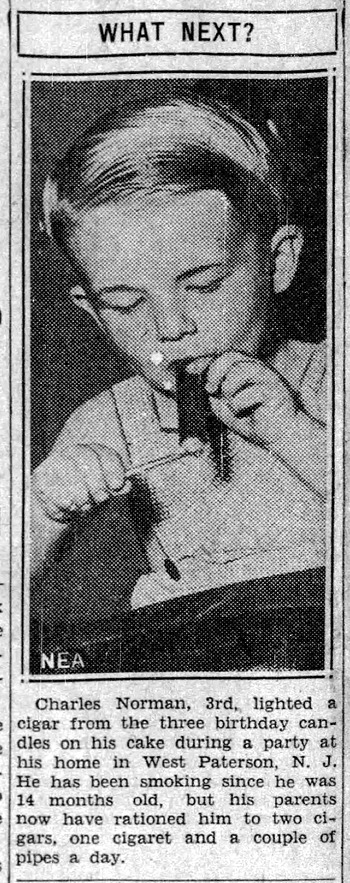
Public Opinion - July 31, 1934
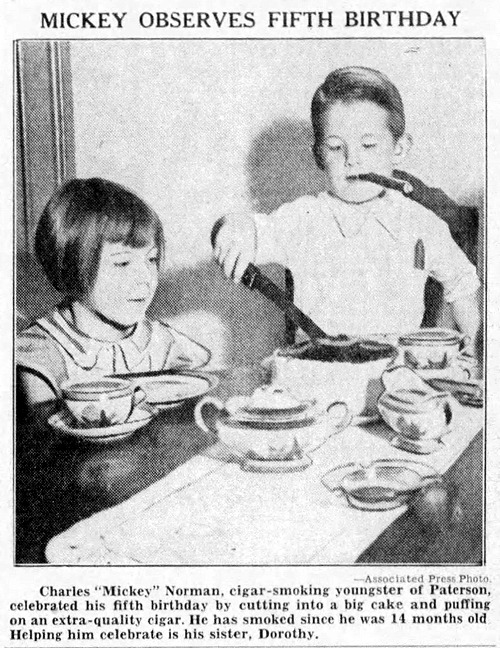
The Hackensack Record - July 29, 1936
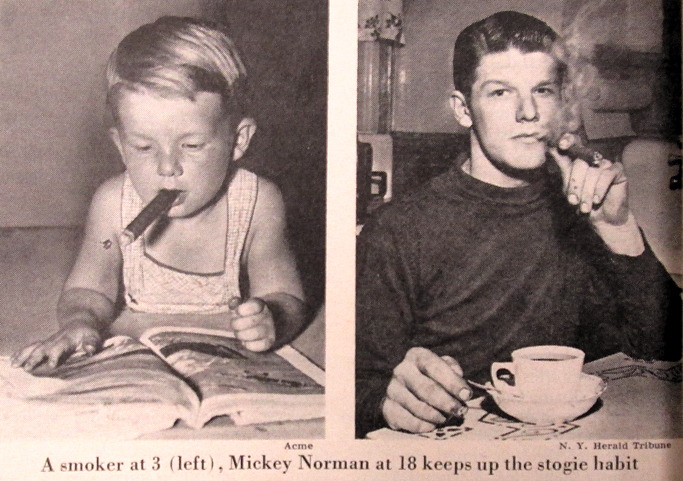
Newsweek - Mar 20, 1950
-Newsweek, Mar 20, 1950
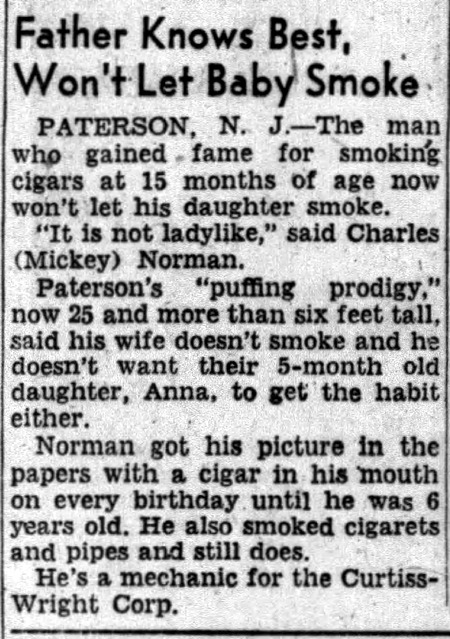
Philadelphia Inquirer - July 30, 1956
Posted By: Alex - Sat Nov 17, 2018 -
Comments (2)
Category: Smoking and Tobacco, 1930s
I’m a Thinner
This ad campaign came out in 1976, before Stephen King's 1984 novel Thinner. But even so, "I'm a Thinner" sounds creepy, like something from a horror novel.It also sounds a bit like they're saying "I'm a sinner" with a lisp. Maybe intentional?
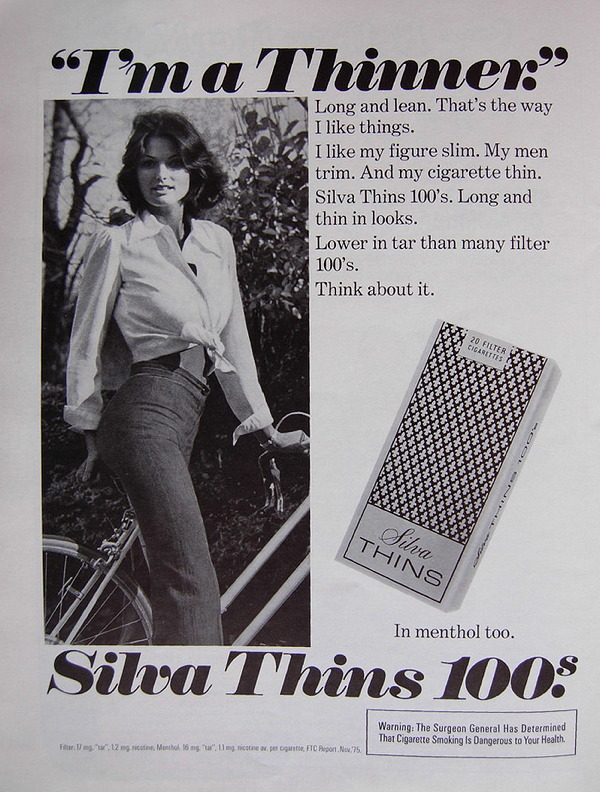
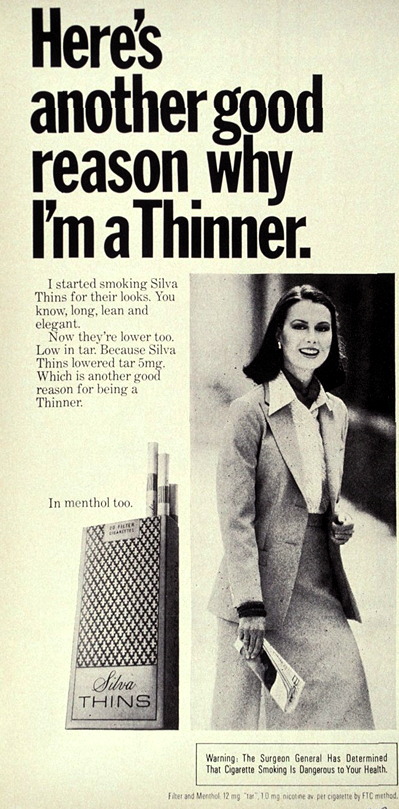
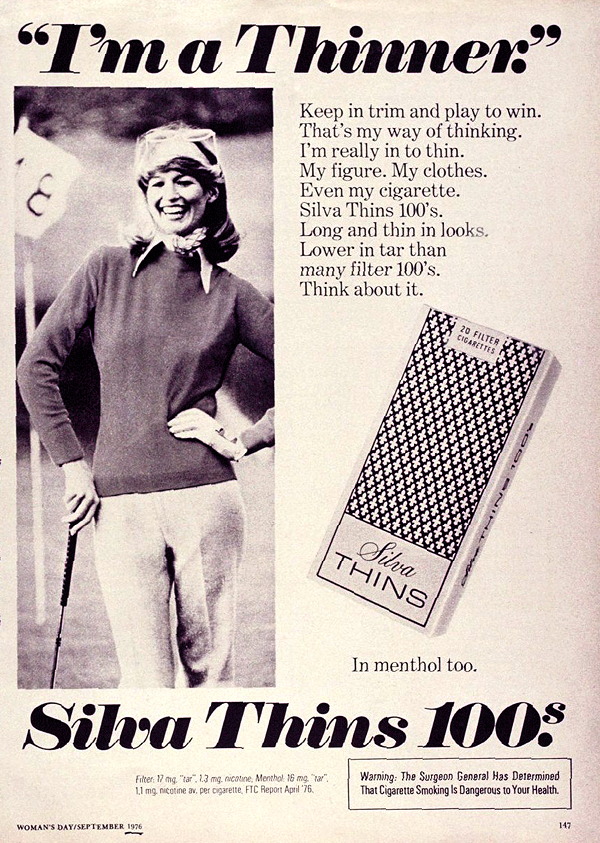
Posted By: Alex - Wed Aug 08, 2018 -
Comments (2)
Category: Advertising, Smoking and Tobacco, 1970s
Boy-Scout Cigarettes
On sale early in the twentieth century. The story is that they were definitely NOT endorsed by the Boy Scouts. Eventually the Scouts got legislation passed making it illegal for companies to use their name.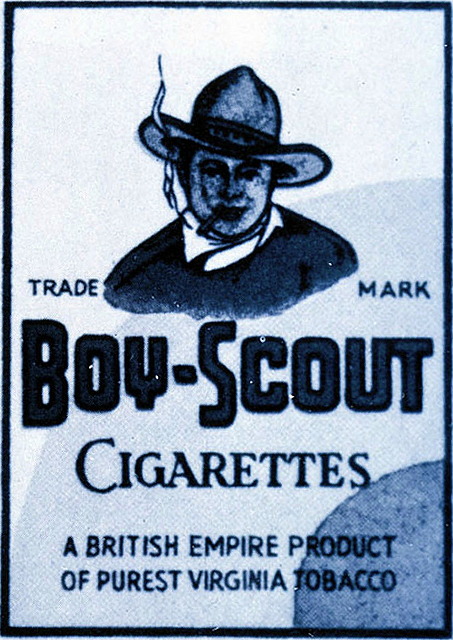
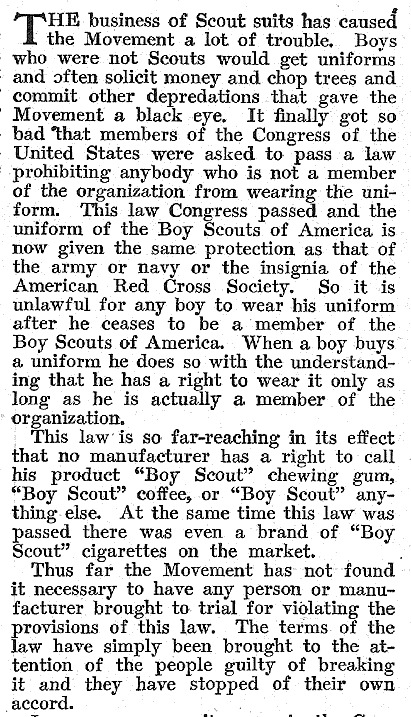
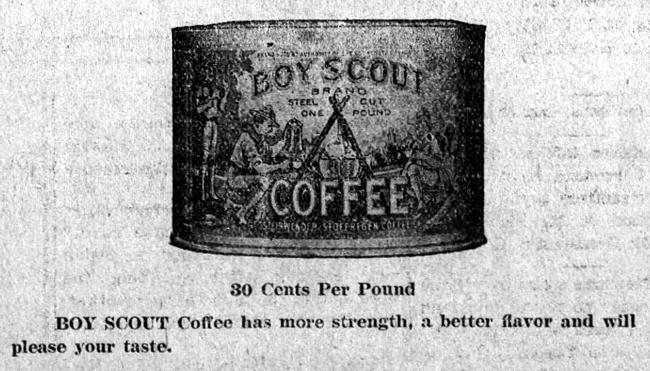
Winfield Daily Free Press - Nov 7, 1917
Posted By: Alex - Thu Aug 02, 2018 -
Comments (5)
Category: Smoking and Tobacco, 1910s
Jim Purol, world-record smoker
One of comedian Jim Purol's recurring gags was to stuff record-setting amounts of things in his mouth, especially cigarettes and cigars. For instance, he set a Guinness world record for smoking seven packs of cigarettes simultaneously. Ironically, he was a non-smoker. From the LA Times (July 18, 1987):Paradoxically, Purol is a nonsmoker. It gets better. His world cigar smoking record was a charity performance benefiting the American Lung Assn.
"I hate smoking," he explained. "I perform the stunts as a statement against smoking. Lookit this picture of me with cigarettes stuffed in my face. This is glamorous? It's disgusting."
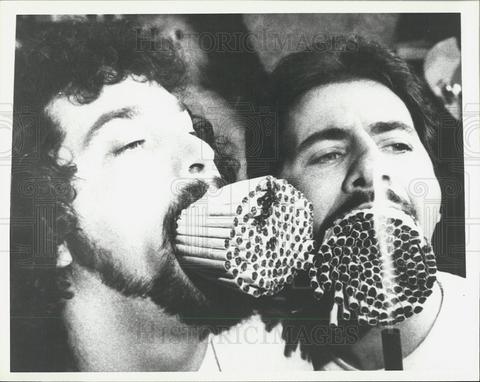
Jim Purol (left) and Mike Papa each smoking 135 cigarettes in five minutes - October 1978
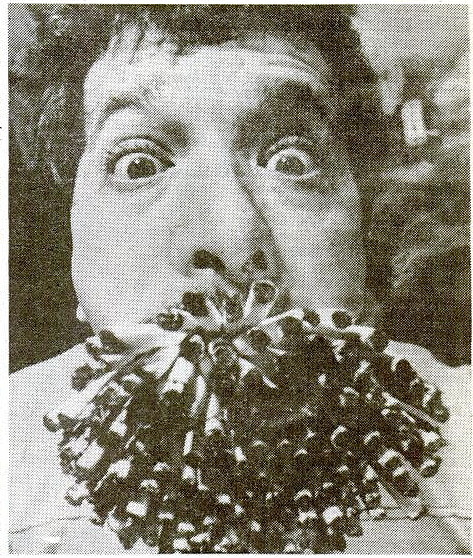
Weekly World News - Jan 1, 1985
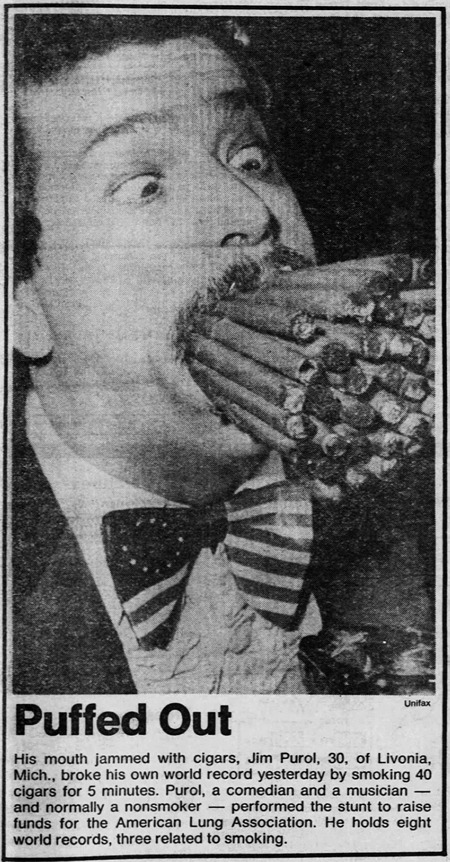
Philadelphia Daily News - Apr 22, 1983
Back in 1976, he also set the world's duration drumming record by drumming for 320 hours.
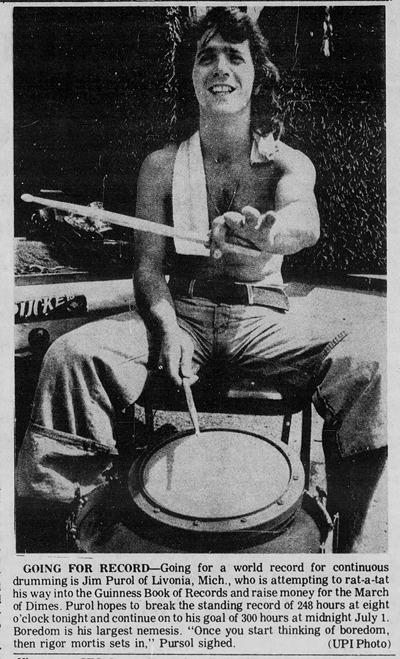
Jasper Herald - June 30, 1976
Posted By: Alex - Tue May 15, 2018 -
Comments (3)
Category: World Records, Smoking and Tobacco
Lois Lane, chain smoker
I've seen Superman II a couple of times, but the fact that Lois Lane was chain smoking never registered with me. I'm guessing that cigarettes would have no effect on Superman. So he'd never bother to smoke. Although he mentions in the clip below that he never drinks when he flies. So evidently he can get drunk.From Drugging the Poor: Legal and Illegal Drugs and Social Inequality, by Merrill Singer:
More in extended >>
Posted By: Alex - Sat Apr 14, 2018 -
Comments (7)
Category: Movies, Advertising, Smoking and Tobacco
The Non-Smokers Inn
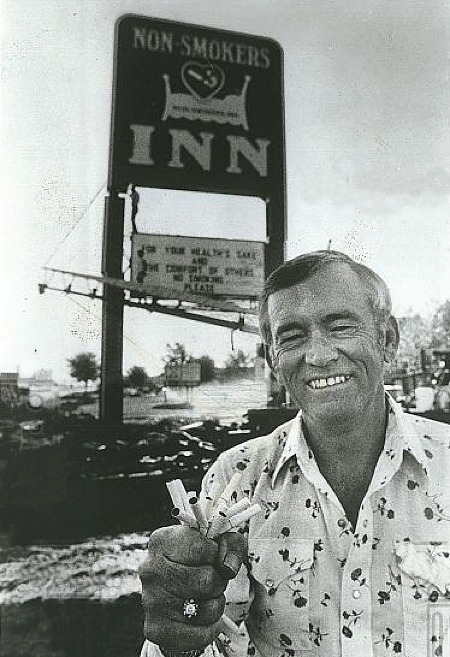
Lyndon Sanders opened the Non-Smokers Inn in 1981 in Dallas. At the time, it was the first exclusively non-smoking hotel in America. Actually it may have been the first to offer any rooms exclusively for non-smokers, period. I'm not sure. But as it turned out, he anticipated the non-smoking trend too well. From cnn.com:
It wasn't that the world had turned its back on his idea -- it was that the world had embraced it too thoroughly. Major hotels had started putting in nonsmoking floors, and advertising the fact; people who didn't smoke suddenly had no trouble finding a clean, fresh-smelling room. The Non-Smokers Inn, struggling for business, had to become something else and let smokers in, because the nonsmokers no longer had to look so hard for what they desired.
Posted By: Alex - Fri Mar 30, 2018 -
Comments (0)
Category: Hotels, Smoking and Tobacco, 1980s

| Who We Are |
|---|
| Alex Boese Alex is the creator and curator of the Museum of Hoaxes. He's also the author of various weird, non-fiction, science-themed books such as Elephants on Acid and Psychedelic Apes. Paul Di Filippo Paul has been paid to put weird ideas into fictional form for over thirty years, in his career as a noted science fiction writer. He has recently begun blogging on many curious topics with three fellow writers at The Inferior 4+1. Contact Us |




